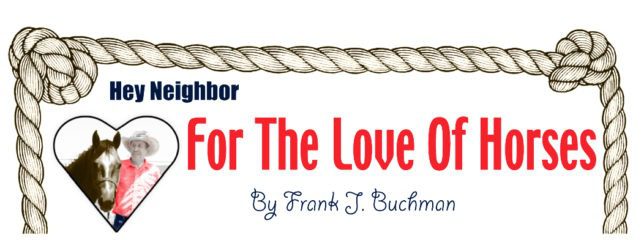“Healing spirits. Changing Futures. Refreshing Lives.”
Those are the highlighted objectives, but “helping horses and helping people” is actually what it’s all about.
“Changing Leads Equine Rescue finds and rescues horses that have been abused, neglected, abandoned or are unwanted,” explained Elizabeth Hill at Woodson Hill Equestrian Center in Kansas City.
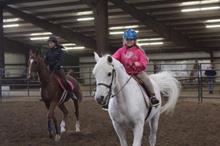
“We provide a safe and peaceful environment where children and families can experience the pleasure of equine activities, while at the same time gaining knowledge about the responsibility of maintaining and caring for a horse during the rehabilitative process with each rescued horse,” Hill said
“Our adoptive network service enables us to unite each rescued horse with a qualified adoptive family to continue providing the care, love and support needed to complete the healing for each horse,” Hill continued.
“Previously known as River Bluff Rescue Ranch at another location, rescue operations, with a name change, were moved here in 2008, after we bought the facilities the year before,” explained Hill, an attorney who had been volunteering at the horse rescue, prior to deeper involvement.
Volunteers and help from many are the ingredients to success and future of the rescue operations, Hill emphatically informed.
“Of course, we want to help horses, and help others benefit from horses, but this requires a continuing network of assistance, physical and financial. Our rescue facility is operated solely on the kindness of volunteers, donations and sponsorships,” she insisted.
“Changing Leads Equine Rescue is a non-profit 501c3 corporation dedicated to changing the lives of rescued horses. Once the horses come into our care, we provide appropriate food, shelter and veterinary care,” Hill stated.
A team of volunteers comes in to groom and ground-train these horses to acclimate them to positive human contact with the hope they will be adopted into caring homes.
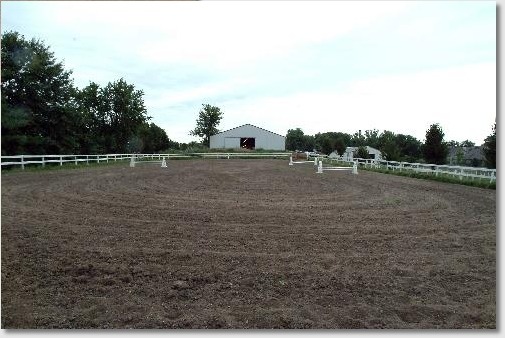
“Here, the horses have a chance to recover physically and emotionally with the help of volunteers. The end goal is to rehabilitate the horses so they may have the opportunity to move forward to permanent homes, where they may live the way horses should, surrounded by love and companionship.
“Our adoptive network service enables us to unite each rescued horse with a qualified adoptive family to continue providing the care, love and support needed to complete the healing for each horse,” Hill said.
Woodson Hill Equestrian Center at 7990 NW Mace Road, Kansas City, Missouri, offers boarding, Western and English riding lessons, training, summer camps, sales, leasing and other horse related activities, with four horse trainers on staff.
On 10 acres, there are indoor and outdoor arenas, the main stall barn with 36 stalls, additional outdoor runs and pens, as well as the “seven-stall lower barn,” Hill related.
“This barn is where we keep the rescue horses, preferably no more than five at a time, but that can vary,” Hill said.
Horses come from many situations; law enforcement for malnourishment, abuse, abandonment, as well as foreclosures, family breakups, illnesses, or loss of place to keep a horse.
“Some of the horses that come here have been well cared for, and their owners are proactive seeing our rescue operations as the best opportunity to continue a good life for their horse to be adopted by a new owner who will appreciate the horse for its value,” Hill explained.
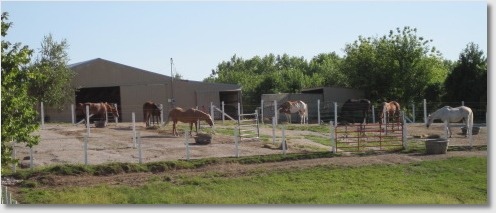
Ownership of a horse is relinquished to the rescue, so whatever is necessary can be done for the horse to be positively advanced and become ready to be adopted.
“We’ve experienced just about every situation one can imagine, but we will not take any horses that are dangerous or not at least broke to lead. With the volunteers helping here, there is too much danger involved with horses that have never been handled or can’t be managed,” Hill said.
Regular volunteer shifts come morning and night to care for the horses. “Our volunteers come from all walks of life, and some have never had any experiences with horses, yet have that desire,” Hill continued. “Most of the helpers generally develop a close comradery with the horses and the other volunteers.”
While 10 horses have been adopted from the rescue this year, Hill said that’s more than the average of about a handful.
A stringent application is evaluated by the rescue’s nine-member board of directors, which Hill serves as treasurer, before an adoption process begins.
“Those wanting to adopt a horse must sign a contract of their abilities to care for the horse, agree that there will be no breeding, track racing or selling the horse, and if a situation changes that they cannot or will not properly care for the horse, it will come back to the rescue,” Hill explained.
An adoption fee is assessed based on the abilities, quality, age and other attributes of the horse. “We’ve been very successful in placing our horses, because we’ve been careful who we accepted,” Hill said.
Future to help horses and more people receive the therapeutic benefits of horseback handling through adoption is most positive for Changing Leads Equine Rescue, but there is unending need for assistance.
“We are a break even operation, now, yet it is a constant challenge to maintain our volunteers and funding,” Hill admitted. “We’re fortunate to have generous sponsors, and also moneymaking projects including the Fuzzy Horse Show series in the fall and spring, which is a major fundraiser.”
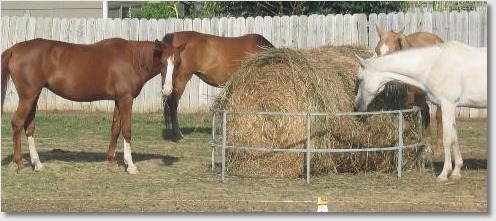
There is always a shortage of specific items for the facility, so Changing Leads Equine Rescue has a “Wish List” of those needs.
It’s on the website, along with horses for adoption, and information about helping in a variety of ways: www.changingleadsequinerescue.org. Hill can be contacted at 816-520-4908, orWoodsonHill@gmail.com.
